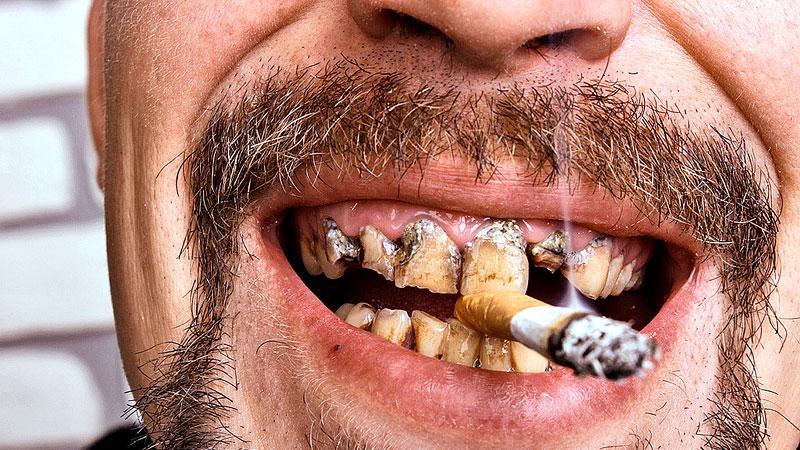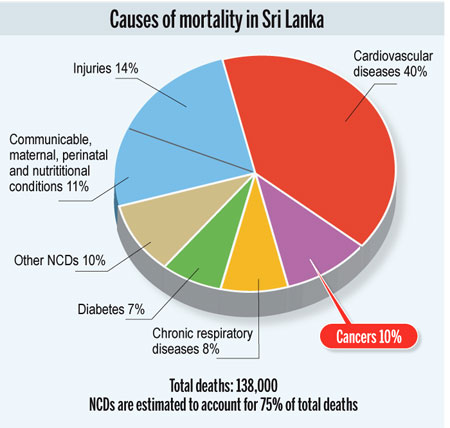
W orld Cancer Day is observed on February 4 with the focus on the positive aspects of the disease rather than the negative. This shift from treatment to prevention and cure is not only timely but very welcome. For right now, if you look at world statistics, there is a sharp surge in new cancer cases worldwide. This seems to reflect a general pessimism and sense of fatality regarding the disease, and the negative attitude of most people on the possibility of any hope of recovery of this disease that to date has eluded all attempts to find a cure. That must change.
The World Health Organization’s (WHO) global theme for World Cancer Day , namely, ‘I Can, We Can’ this year as well, sends a positive message to all cancer sufferers, given the availability of free tests in every state health facility.
However, those volunteering to undergo such tests is minimal.
 Cancer data from the Cancer Registry has revealed that, while breast cancer by far is the most common cancer in women, in males the most common cancers are in the lip, oral cavity and pharynx , followed by trachea bronchus and lung, lymphoma, larynx, bladder, colon, rectum and prostrate. Oral cancer is thus a leading cause for morbidity and mortality.
Cancer data from the Cancer Registry has revealed that, while breast cancer by far is the most common cancer in women, in males the most common cancers are in the lip, oral cavity and pharynx , followed by trachea bronchus and lung, lymphoma, larynx, bladder, colon, rectum and prostrate. Oral cancer is thus a leading cause for morbidity and mortality.
To get more insights into oral cancer the Sunday Observer spoke to Consultant Physician and Oncologist , Dr Hemantha Amarasinghe.
Excerpts…
Q. Cancer incidence has risen in the past decade. Do you agree?
A. Yes. There is a definite increase in the past decade. According to the latest published National Cancer Incidence data in 2010, one in every 10 Sri Lankans carries a life time risk of developing cancer. A total of 16,963 new cancer patients were registered for treatment during the year 2010, comprising males - 7,993 and females - 8,970.
In 2000, only 10,925 cancer patients were registered of whom males totalled 5,130 and females 5,795. This shows an increase of 6,000 new patients annually, in the past decade.
Q. Your specialty is Oral Cancer. What is oral cancer? Are there different types of oral cancers?
A. Cancer in the lip, tongue, mucosa of the oral cavity, palate and oropharynx are known as oral cancer. There are different types of oral cancer according to the cell type involved in the initiation of cancer.
More than 90% are squamous cell carcinoma and the rest are adenoid cystic carcinoma, verrucous carcinoma, mucoepidermoid carcinoma, etc.
Q. What is the incidence of oral cancer in Sri Lanka?
A. The incidence of cancer of the Oral cavity and Oro-pharynx in Sri Lanka, excluding salivary neoplasms, standardized to the world standard population in the year 2010, was 20.7 and 5.4 per 100,000 populations, in males and females, respectively. According to the National Cancer Registry 2010, 14.3% of all reported cancers are oral cancer and carrying highest mortality rate among different types of cancers (3 deaths per day) (3).
Q. Incidence rates in 1) males 2) females?
A. Incidence of oral cancer cases in males in 2010 was 1,888, in females the numbers were much less – 534. The total number amounted to 2,422. The lifetime risk of suffering from oral cancer for Sri Lankan males is 1 in 40.
Q. Age wise, who are most vulnerable to getting oral cancer? Youth? Elderly? Why?
A. There are two types of presentation in the present context. Some people are addicted to traditional betel chewing and end up with cancer in the elderly age. There is another group who chew commercial preparations of tobacco and arecanut e.g. barbul, beeda, mawa, hans, etc, who are now becoming victims of cancer at a very young age. This emerging new trend is very disturbing.
Q. What do you consider as the main contributory cause for oral cancer among Lankans?
A. Tobacco use is the single most important risk factor for cancers. It is estimated that if tobacco use is prevented, around 50% of all preventable cancers can be averted. According to the National Cancer Registry 2010, top three cancers for Sri Lankan males are cancer of the mouth, lung and oesophagus which are directly associated with tobacco. Tobacco Free Initiatives (TFI) of WHO, has implemented several strategies to curtail the use of tobacco. While this may have contributed to a gradual decline in smoking, there is anecdotal evidence to suggest that while many people have reduced or quit cigarette smoking following recent interactions, ex-smokers have turned to chewing betel quids and other forms of arecanut, frequently including smokeless tobacco. Chewing betel with tobacco or arecanut is considered as carcinogenic to human: which cause cancer of the mouth and oesophagus. According to the study conducted in the Sabaragamuwa Province of Sri Lanka in 2008, has shown a very high prevalence (53%) of betel chewing in the rural and estate sector and also very high prevalence of pre-cancer.
The second major risk factor for oral cancer is excessive use of alcohol. Some viruses are also considered as risk factors for oral cancer, especially, human papilloma virus.
Q. We see more young people getting oral cancer today. Why? What has caused it? Lifestyle changes? Unhealthy habits?
A. The main reason for the recent trend of oral cancer among the young is the use of commercial preparation of smokeless tobacco and arecanut, e.g. babul, beeda, mawa, hans etc.
Q. It is said, betel chewing with tobacco is responsible for most mouth cancers in the country. Your comments?
A. Betel chewing with tobacco and arecanut is considered as a number one risk factor for oral cancer. As betel chewing is deeply seated in rural and semi urban communities, Buddhist priests play an important role in cessation of betel quid chewing. Therefore, the Health Ministry, with the collaboration of the Department of Buddhist Affairs has conducted advocacy programs with the participation of Buddhist priests on cessation of betel quid chewing in the community and other anti-tobacco activities. It has been decided to remove the tobacco, arecanut and lime from the “Dahath Wattiya”.
Q. What are the symptoms of oral cancer? How are they identified in their early stages?
A. Oral cancer patients who come to the hospitals have the following symptoms: mouth ulcer, swelling and difficulty in opening the mouth, extended red and white lesions on the oral cavity. Oral cancer is often preceded by oral potentially malignant disorders (OPMD). In Sri Lanka, the prevalence of oral leukoplakia and of Oral Sub mucous Fibrosis (OSF) is reported as 26.2 and 4.0 per 1,000 respectively.
The following lesions and conditions are usually described under “precancer” OPMD: leukoplakia, erythroplakia, submucous fibrosis, lichen planus, palatal lesions of reverse smoking, discoid lupus erythematosus, and hereditary disorders, such as, dyskeratosis congenita and epidermolysis bullosa. Of these, leukoplakia, submucous fibrosis and lichen planus are the commonly found disorders in OPMD.
However, the health system of the country has failed so far to carry out systematic interventions to detect those with OPMD and manage them, with a view to preventing oral cancers. The early detection and appropriate management of OPMD with habit intervention is one of the main strategies to reduce the burden of oral cancer in Sri Lanka.
Q. Any statistics on the emerging trend of young males getting oral cancer due to imported betel like, babul and smokeless cigarettes?
A. Surveys are being done now.
Q. Have there been any new advancements in detecting, preventing and treating oral cancer in recent years? Are they available in Sri Lanka?
A. Yes. New advanced equipment and methods are available in Sri Lanka in many leading hospitals with upgraded facilities in dental care free of charge.
Q. Your advice on preventing the disease, to school authorities, parents and youth?
A. Knowledge on risk factors, fatality of the disease needs to be enhanced among high risk groups for oral cancer as well as schoolchildren, adolescents and youth, who are increasingly becoming victims of oral cancer because of their unhealthy lifestyles.
Q. Any message to our decision makers?
A. Legislation should be imposed to curtail sale, manufacture and import of all smokeless tobacco and arecanut products.
Q. To Health authorities?
A. Facilities for screening for early detection of oral cancer should also be strengthened throughout the country.
NCCP’s role in preventing cancer spread
Being the national focal point in cancer prevention and control, the Sunday Observer asked the NCCP what it was doing to prevent cancer spread.
Co-ordinator and community physician, NCCP, Dr Suraj Perera said, “Our vision and goal is to make this a country with a low incidence of preventable cancers and higher survival rates. We also want to ensure minimal disabilities and suffering among the public from cancer.”
How? We asked.
“By controlling and combating determinants of cancers, ensuring early detection and providing holistic and accessible cancer care which addresses curative treatment options through an Evidence based approach.”
On the new outlook of a positive approach to the disease underlined in this year’s theme, ‘I can , We can”, he said, ‘I Can’ entails making healthy lifestyle choices , and understanding that early detection saves lives. It means asking for support and supporting others and to take control of one’s cancer journey. To love and be loved, to be oneself, to return to work after being diagnosed as a victim, and to share our story with others.
‘We Can’ means, inspiring action, taking action to prevent cancer. It means challenging perceptions, creating healthy environments, improving cancer care. It means building a quality cancer workforce, shaping policy change, making a case for more cancer investigations and research.”
The NCCP won the Commonwealth Digital Health Awards in 2016 for the design and development of a metro based data base management system (DEM) to gather cancer registry data from cancer treatment centers. Dr Perera said that due to positive outcomes of the program it would be expanded in the future. “We also raise awareness of the disease with health education programs , street dramas, and poster rallies,” he said. In addition, the NCCP runs a Cancer Early Detection Center offering many free health services. They include Breast screening, mamorgrams and ultrasound examination of breasts for women as well as cervical screening e.g. pap smear testing, Colposcopic examination, Trans vaginal ultra sonic examination. In addition, for males and females there was also an Oral Cancer screening center, thyroid gland examination tests, blood pressure measurement and Body Mass Index measurements. A counselling service by trained counsellors had also been provided for r cancer survivors, he said.
The NCCP now has a hotline 2368627 which is open from 8 a.m to 4 p.m on Monday to Friday, but closes on public holidays. For further inquiries call: 0113159227.
